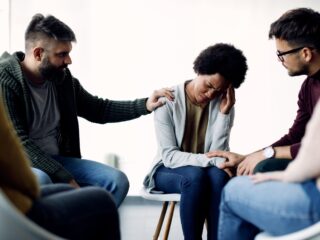It’s difficult to meet someone who hasn’t been affected by the ongoing opioid crisis. Thousands of husbands, daughters, and friends have fallen victim to opioids’ addiction and power leaving public health and law enforcement officials scrambling to find answers. But what about fighting drug use with drug use? That’s what many in Ohio are debating the Buckeye State and others are looking to medical marijuana to help fight the ongoing epidemic. Is cannabis a tool to fight opioid abuse or is it just another drug shuffling through Ohio homes?
According to the Ohio Medical Marijuana Control Program over 120 pounds of cannabis has been sold since Ohio began its medical marijuana program in January of 2018. There are currently 21 qualifying conditions that allow a doctor to issue a prescription for medical marijuana. Opioid addiction is currently not one of those conditions, but some current health and addiction officials argue medical marijuana’s benefits against opioid abuse are already proven.
A 2018 study by medical journal JAMA Internal Medicine closely analyzed the link between medical marijuana laws and opioid prescriptions and found that opioid prescriptions decreased around 10% in states with medical cannabis laws. Cannabis proponents also point to a survey by the Minnesota Department of Health that showed 63% of opioid addicts prescribed medical cannabis “were able to reduce or eliminate opioid usage after six months.” A study in New Mexico saw medical cannabis users reducing or altogether eliminating their opioid use at a much higher rate compared to non-cannabis users. In Michigan when state officials collected data on its cannabis program they found medical cannabis was associated with a 64% decrease in opioid abuse with most patients reporting an overall higher quality of life.
The data suggest that medical cannabis works, but not everyone in Ohio is including some addiction experts.
Dr. Mark Hurst of the Ohio Department of Mental Health and Addiction Services told the Cincinnati Enquirer “There is no scientific evidence that marijuana is an effective treatment for opioid addiction.” The medical director of the Employee Health Services at the Cleveland Clinic Paul Terpeluk echoed Hurst’s sentiments of the lack of multiple studies that show direct benefits. The proponents of medical cannabis have seen these arguments before and aren’t having any of it.
“At this point, the data is clear, consistent, and convincing. When legal access to marijuana is available, you a see decline in abuse of and death from opioids. To deny that reality at this point is to deny gravity,” said Paul Armentano of the National Organization for the Reform of Marijuana Laws.
Personal stories of overcoming opioids with cannabis are also helping the proponents’ cause. Betty Cox, like many addicts, began her opioid addiction with a simple prescription for chronic pain – 15 years later Cox is still hooked to large amounts of morphine and hydrocodone. She decided to ditch opioids when her pharmacy forced her to fill out paperwork stating she was aware of her prescription’s propensity for addiction. “That’s when I knew I had to get off these drugs,” she said. “But I had to keep working, and keep the pain down, and take care of my kids. I didn’t know how I was going to do this.”
Cox used cannabis to taper off opioids and is currently opioid-free and, in less pain than before. Mark Farrar of Cleveland began using heroin at 19 to self-medicate his PTSD but eight years later was still highly addicted after multiple tries to stop. In 2018 Farrar began using medical cannabis. A few months later Farrar has stopped using all opioids and is gainfully employed.
It’s not just anecdotes from single patients that show the power of cannabis – Ohio doctors have seen it for themselves. Dr. William Sawyer is old-fashioned in many regards. He still makes house calls and uses his personal number with patients, but he’s not behind the curve on medical cannabis. He regularly prescribes cannabis to his patients hooked or prescribed opioids. Sawyer has seen enough of his patients move from opioids to cannabis to not require mountains of studies. “I remind them that it is still not proven that hand-washing at a newborn ICU prevents infections,” he said. “So why do you wash your hands? Citizen science tells us that medical marijuana obviously will help. As a physician, I know it will.”
Most Americans are on the side of medical marijuana. A Quinnipiac Poll taken in April 2018 showed a whopping 93% of respondents stating they supported the use of medical cannabis. 70% surveyed in the same poll believed the federal government should not interfere in states that have passed their own recreational or medical marijuana laws.
Those percentages are having a tough time translating to elected officials.
Of 110 mayors polled by Boston university only 53% supported marijuana sales in their city with 35% stating outright opposition. Former Speaker of the House and Ohio Representative John Boehner was one of medical marijuana’s biggest opponents while serving but now sits on the board of cannabis firm Acreage Holdings and states he changed his mind after seeing marijuana’s therapeutic effects on his friend’s back pain and the outpouring of support from veterans who say medical cannabis has helped their PTSD and other issues.
It may be years of research and studies before we have a deep understanding of how medical cannabis affects opioid addiction but there has already been enough evidence to convince several doctors, health officials, and patients that cannabis is the path to freedom. Unfortunately for many Ohioans still hooked it could take months and years of working through red tape to get them the help they need. “It kills me to think all the stuff people have had to go through in order to get something that we know saves lives,” said Cox







